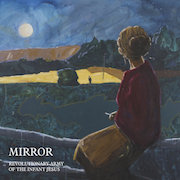Listening today to Mirror, the second album by The Revolutionary Army of the Infant Jesus that’s about to receive its first vinyl release from Occultation Recordings after a quarter of a century, finds the Liverpool collective sounding as contemporary – or as far ahead of their time – in 2017 as they did back in 1991.
With a name borrowed from the fictitious revolutionary group in Luis Buñuel’s final film That Obscure Object Of Desire, the attention-averse trio, who regard themselves as a creative collective rather than a band, make wildly eclectic music rooted in liturgical texts and ecclesiastical iconography, contrasting ethereal beauty with stark brutalism. Celestial choirs rub their cassocked shoulders with squalls of industrial noise, political speeches are interwoven with celluloid dialogue, instrumentation ranges from sombre neo-classical piano to pounding dance beats by way of folk, free-form jazz and experimental psychedelia.
That they have achieved neither the critical attention of contemporaries such as Dead Can Dance, who also blended some mix of those same genres with electronica, nor the commercial success of Enigma, who topped European charts with their enigmatically misspelt melange of dance beats and Gregorian chants Sadeness (part 1), probably has as much to do with their attitude as their wilfully eclectic music. Eschewing the traditional promotional machinery of interviews and publicity in favour of letting the music be discovered, and consequently depriving themselves of radio airplay or anything in the way of press to alert potential listeners to their pleasures, they also disguised themselves during their rare live appearances, performing behind flimsy screens so that they were visible only in silhouette.
It will come as little surprise, therefore, to learn that neither Mirror nor its predecessor The Gift Of Tears – nor their 2015 comeback album Beauty Will Save The World following a two-decade-long hiaitus – made much impact on the public at large. At least they have, at their record company’s urging, belatedly broken their self-imposed “no interviews” rule to speak to one solitary publication: The Church Times. It’s an appropriate choice because their sound, as exemplified on Mirror, wears a strong ecclesiastical influence on its sleeve, blending liturgical music – choral chants, samples and solo recordings of a religious nature – into a host of other influences ranging from film dialogue to folk and jazz. Within its ever-shifting tapestry of sounds and influences, there are moments of transcendent beauty, often involving the flute and saxophone, and occasionally meandering into early-Floydian electronic experimentation.
It’s a diverse musical palette, ranging from John Barry-ish keyboard themes (the opening ‘Shadowlands’ and ‘Dies Irae’ could come from lost 1960s TV shows, while the Morricone-esque ‘Theme De L’Homme Qui N’a Pas Cru En Lui-Meme’ could soundtrack an unmade spaghetti western), through literary, spiritual and political allusions, field recordings and myriad samples including dialogue from European experimental cinema (Cocteau, Tarkovsky), Spanish poets and Albanian/East German propaganda broadcasts taken from obscure records borrowed from their local library.
The Rev Army, as they may well call themselves (or not), consist of Paul Boyce (voice, clarinet, keyboard), Jon Egan (voice, guitar, melodic, keyboard, viola) and Leslie Hampson (percussion, guitar, voice, keyboard), supplemented by a host of other musicians, of whom the most prominent are Bill Dawson, whose free-form sax solo takes the dreamy, pastoral ‘Immaculado’ into the realms of transcendent beauty. Elsewhere, there are monk-like incantations (‘Joy Of The Cross’), sexy Frenchwomen spilling lascivious secrets over galloping dance rhythms (‘Le Monde Du Silence’), dub-like productions (‘Hymn To Dionysus’) and tribal electronica reminiscent of Pink Floyd’s film soundtrack ‘More’ (‘Nativity’).
As catholic in its influences as in its inspiration, it’s a collection well worthy of rediscovery, and well worth the time required to investigate its wealth of pleasures, not least because it is not available on any streaming services. Mirror and its makers may not bring salvation, but it offers considerably more spiritual richness than any number of Ed Sheeran records, and much more besides.


